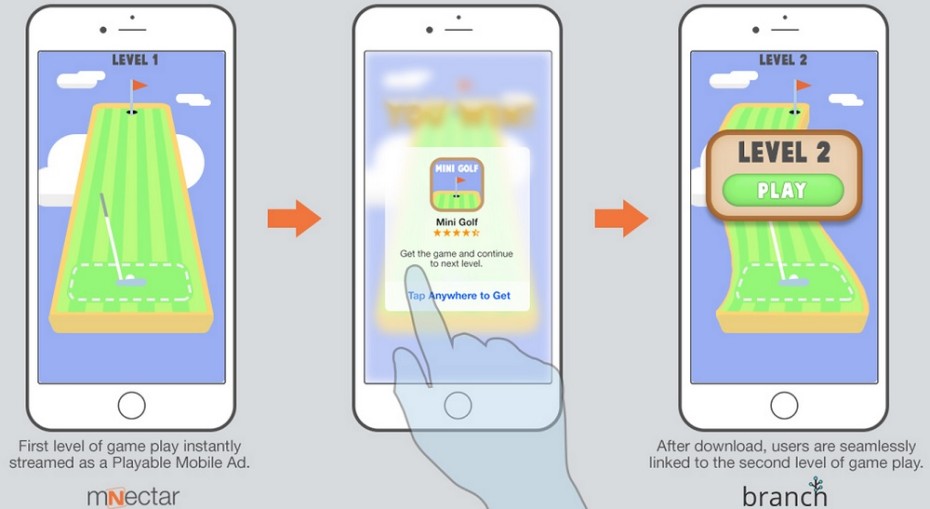Wally Nguyen, CEO of mNectar, helped found the company about three and a half years ago. Inspiration hit while on iTunes, they were able to listen to a song for 30 seconds before buying it or the album. Wally had a “light-bulb moment” that if you could do that with a song, then why not with a game.
“My co-founder comes from a technical background and there were ads that let you manipulate an image back then, and I asked if they had that, why can’t you play a game?” Wally said. “Back then we raised a little bit of a money with developers like with Kabam being our first customers. With playable ads, 99 percent of our customers are game developers or publishers, giving people a sample of their games.”
RIP Downloads

mNectar is keenly aware of issues surrounding apps, noting that one out of four people uninstall apps after one use. There was an issue with the app discovery experience and they determined downloads were the barrier. Stating that “downloads are dead”, Wally notes that games are “stuck in a ’90s mentality” of needing a physical product or download - people stream music and movies after all, why not games?

“It’s an ecosystem problem,” detailed Wally. “Barrier to entry is very low getting on various app stores, but there’s 3 million apps that are out there now. Consumers like choice but there’s the paradox of choice – at CostCo you can sample goods and people will be more likely to buy it if they try it. More and more apps come out, one out of 100 to 5000 are any good. The top apps don’t change, and unless you have an app like Snapchat it’s hard to get the top 100.”
Turning to the AAA gaming sphere, Wally made the comparison to streaming services, even if those products that were a bit ahead of their time. They still see a huge potential market for such products, maybe for the Apple TV once the internet improves that will allow TV boxes to provide on-demand gaming. “You have to buy these packaged games for $60, but a few years ago there was Gaikai and OnLive offering a choice to play without downloading or a disc,” they said. “Gamers want to see what they were getting that isn’t just a trailer. Users want to be informed and see what they’re getting right away.”
“So yeah, downloading itself is dead. I can’t think of the last thing I downloaded,” Wally added. “In 2008, you didn’t have to download Farmville. You’ve never had to download Flash games. At Google IO they detailed instant apps and they are streamed to you. There’s business reasons why they want this and you’ll see it more and more.”
Skyrocketing CPI
Facebook used to be a significant rising medium for social games, but Wally noted that when Facebook Credits was implemented in 2009, it put a serious damper on games. While Facebook was good for user acquisition at first, where developers could easily use their players to advertise their games using their feeds, changes were made that eliminated that easy viral marketing and user acquisition costs went up. Many of those developers responded by going to smartphone platforms.

“Developers went to iOS and Android where user acquisition cost pennies, but now that cost is between $5 and $10 for a single user,” Willy explained. “This is an impossible rate if you’re an independent developer. That lower take home money from Facebook is coming to mobile. What you’re buying for CPI is a opportunity for someone to buy something, and that’s basically a gamble with your own money.

“We don’t charge in cost-per-install, what we do is charge the play time. We know if a user has played a certain amount, like for a minute and a half. Game developers like the model – initially it was a hard to talk about it, but not a single advertiser has left. We have data from the sessions that developers can use to improve their game. They can learn a lot about their users this way. You don’t have to do anything fancy either, just put in a sample of your game.”
“We are here to show users a better way than video. For video ads, 81 percent are muted by users, 67 percent of users are annoyed with pre-roll video and many are considering an ad blocker because of them,” Wally detailed. “With playable, it’s the real game, and everything we do is opt in so there’s no pre-roll stuff and they can exit out where they want. We show that a user that plays a playable is seven times more likely to install. If users know what they’re getting if it’s bad or not. It’s great for user trust.”
Cycling the Whales from Game to Game
With paid app searches, the top companies are able to pay to keep things the way they are. It’s hard for developers that don’t have those sorts of resources to compete. Noting that even with apps that are free to download, Wally says they’re not free in time. On average, users spend three minutes downloading an app but give an app overall seven minutes to try it out, meaning nearly half of the time users will give an app will be in the download step.
“In a perfect world, cost-per-install would be at an unsustainable level. But the reality: it’s sustainable by 20 game studios,” Wally said. “Supercell, Machine Zone, Zynga and the like can do it, but the rest can’t. I’m personal friends with a lot of game developers, and when the raised money isn’t for the development cost, the start-up capital goes towards user acquisition. A friend had VC and when they talked to developers their first question was, ‘Whats you’re UA plan?’ and others as questions like ‘Can we spend our way to success?’ and ‘Do we have monetary model?’”
“Some developers like Glu Mobile use celebrities to get their products noticed, like with the Gordon Ramsay game, but there’s some fee there. Kim Kardashian got about $20 million USD for her game. I wonder if it’s sustainable by the large ones, like that Game of War ad with Mariah Carey and the like,” they noted, adding, “With other ad networks, they’re growing because they’re identifying whale users with these ads and recycling them from game to game. X, Y and Z network is targeting users with particular ads and getting them to come over to the newest variation of whatever game series they have. That bottoms out eventually, and people are going to get wise to what they’re doing.”
Universal Apps
Wally looks at the number of apps out there that have their own servers for download that are being serviced constantly with updates and sees a system that needs to change. They foresee a future where apps are like web services that live on your device. Wally also sees a huge future for so-called “universal apps”.

“What is ubiquitous is services like WeChat in China,” Wally said. “It’s a force to be reckoned with; you can text, make payments, message a cab or book a doctor appointment. It’s the app everyone uses. What we do in the West is we use separate apps. Streaming makes sense within the context of these universal apps, and users are going to use their phones as an access point. Facebook is positioning as a universal apps. Snapchat, Facebook, Twitter, they will they be universal apps soon enough.”
“The future is nothing is downloaded and everything is streamed,” they noted. “Apps operate like websites, and it’s available wherever there’s web access, which will be pretty much anywhere.”
Comments











